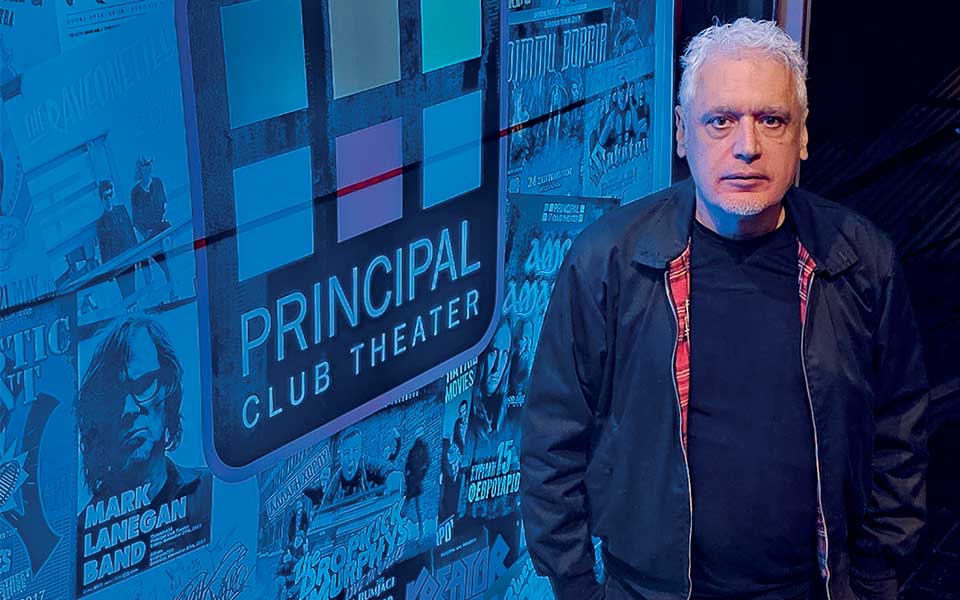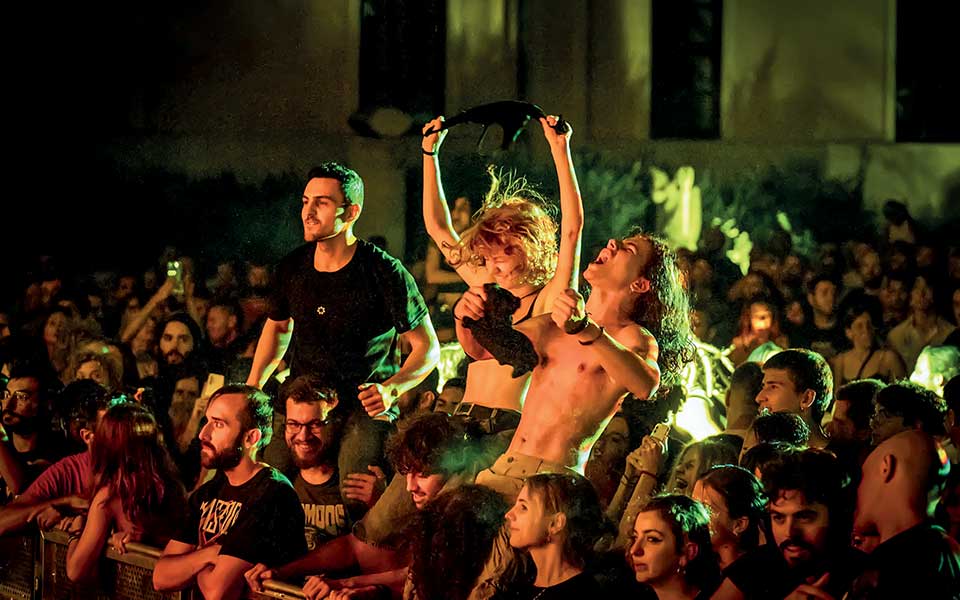Summer 2025: What’s Going on in Athens
A summer mix of cultural events...

Nouvelle Vague performing with vocalists Phoebe Killdeer and Mélanie Pain.
© Yannis Psathas
“Why would you move here from NYC?” It’s been over two decades, and I still get asked this a couple of times a week. The fact is that Thessaloniki never gave me a chance to miss the Big Apple. Growing up in a warehouse in TriBeCa in the ’80s and then doing A&R for our hardcore/punk/noise record label Wreck-Age throughout the 1990s was close to perfect. But Thessaloniki has a similar creative energy. It’s known abroad for its Byzantine churches and the romantic Ano Poli, but for locals, these are just the backdrop to their modern lives. The city is thick with contemporary culture, with galleries, workshops and studios opening all the time. And concerts – there are lots of concerts. Thessaloniki has Greece’s largest university, but more than that, a love of music and nightlife runs bone-deep in this town, which was once known for its cafés chantants and cafés aman. A generation later, it became known for rebetiko, and a generation after that, for the genre of popular music known as entechno. It’s a cultured city that knows how to have a good time.
This made Thessaloniki easy to love, and my husband Pavlos’ job helped with that. Just after we came here with our daughters, Charlene and Mei Mei, who were then six and two, he started handling the bookings at Mylos, a mill complex on the west side that Nikos Stefanidis had transformed into a multi-venue space. Concerts with Pavlos were, for me, the equivalent of an ethnic enclave in New York – a place to feel at home in a new land. Conventional middle-class neighborhood life in Greece in 1999 was more conservative and conformist than it is today, and that was a much bigger adjustment than the new country and new language.

Pavlos Ioannidis at the club.
© Charlene Ioannidi
When Stefanidis started thinking about a new place, he asked Pavlos to go in with him. The Principal, as it was already called, sounded unpromising; far from the center of town on the road to Chalkidiki, with no public transport access, it had so long stood abandoned that it had weeds growing inside. But it also had presence – a large round space with semi-circular staircases; a 16-metre-high wooden ceiling with thick beams; wrap-around balconies; and private boxes like an opera house. We’d left the record label in good hands and come to Greece without much of a plan, thinking of perhaps doing something completely different, but working in culture had been rewarding; we were familiar with the volatility – but also the emotional highs – of the music business, so it was easy to look past the weeds and everything else. That Easter, we grilled our lamb in the parking lot because our opening weekend was just five days away, and it was sold out. The paint was still wet when the doors opened. Since then, the club has moved three times: first to Mylos, then Fix, and finally back to Mylos.
As it turned out, club life and family life were surprisingly compatible. Most of Pavlos’ work hours were when the girls were already sleeping. I added the club shopping to the weekly routine, checking hospitality riders for upcoming shows and putting what we needed for the catering on my list for the laiki (the farmers’ market). Most children are not actively part of their parents’ work worlds unless the family has, say, a taverna or a farm. Principal Club Theater is like our farm – demanding, and with inconvenient hours. It dictates our family calendar, but it brings us all together a lot. This has always been the girls’ world, too; back in New York, all the adults they’d known were in bands. In time, they started working at the club. Not many 20-year-olds regularly stop for a gyros or drop in for a nightcap at the metal club Eightball with their dad at 3 am on their way home from work. That’s been nice.

The crowd for Villagers of Ioannina City at Moni Lazariston, 2023.
© Anastasia Zisopoulou
Investing in culture is enormously risky. It’s great when ticket sales go well, but at the end of the night, it’s really about the event – the quality of the crowd and of the performers, and the collective memory it creates. A successful concert is about much more than money. There are transcendent moments when the whole place becomes one, like when Sivert Høyem and Madrugada give “Majesty” over to the crowd, or everyone joins in Joy Division’s “Love Will Tear Us Apart” with Nouvelle Vague – they’ve each played here close to ten times. Everyone singing “Ace of Spades” with Lemmy, and another time with Tricky, was memorable. The crowd was quiet, though, when China Forbes sang “Ta Paidia tou Pirea” with Pink Martini; they didn’t want to miss a word.
Nights like these are as much about the crowd as they are about the performers. Thessaloniki is a long-time favorite of touring bands. There’s no better audience to play for – they’re invested and well-informed. They are familiar with the bands’ histories and catalogues, and they understand the cultural context. It’s a crowd that shows a lot of love, and bands give it back. Some have a very close relationship with the city, coming back often over the years. Thievery Corporation played their first show in Europe in Thessaloniki, and they’ve returned a few times since – once at the harbor when they had to take a break mid-set for a thunderstorm; we were all drenched. They were here just recently for the Moni Lazariston festival, which Pavlos is also involved with, and it was one of the season’s highlights.

Set lists, drum kits, the club family and a few of the 1,000+ shows.
© Collage by Charlene Ioannidi
Working with people whose music you’ve always known is revealing. It takes a devotion to art and a generosity of character to be on the road for weeks at a time, giving so much of yourself night after night. Sometimes, the more famous the name, the simpler the list; they already know who they are. Jane Birkin was particularly classy and cool; she traveled with her dog, and for her dressing room, she just asked for sliced tomatoes with good olive oil (I brought our own from Crete). Robert Plant wanted to walk around the Ladadika and have a gyros to go for dinner (the guy preparing it told Pavlos that the foreign guy he was serving looked exactly like Robert Plant; when he found out that was really who was in front of him, his hands were shaking so much he could barely wrap up the pita). Morrissey wanted something so simple for dinner that I cooked for him myself on a hotplate behind the bar.
Hosting the bands is always fun, especially those we’ve seen over the years and been out with after the shows. Bands enjoy Thessaloniki; our little city deserves its good reputation for nightlife and culture, and we’re fortunate to be a part of that. We’re also fortunate in our own community; some of the people at the club have been working there for years, even from the very beginning. For us, family Christmas usually means hearing the Speakeasies’ Swing Band do “Santa Baby” at our annual holiday party. There’s no place we’d rather be; Principal Club Theater is a second home, a second family.
There have been so many special shows over the years that it’s hard to count, but a few do stand out, including Stereo MCs a couple of times. Tricky and Dub Pistols, Agnostic Front and Madball were special for us, as we had done a record with them back in New York. There was Manu Chao, Calexico, Pink Martini, Everlast, Tindersticks and Einstürzende Neubauten. France never disappoints, with Yann Tiersen, Zaz, Nouvelle Vague, Wax Tailor and Chinese Man. There was that really large Madrugada show at the PAOK arena. Massive Attack, Kaiser Chiefs, Isaac Hayes, Bauhaus, Pet Shop Boys, Faithless, Motörhead, Tuxedomoon, Hooverphonic, Killing Joke, Blind Guardian, Mulatu Astatke, Tiger Lillies, Saint Etienne, Puressence, Gotan Project, Morrissey, Tricky, Faithless, Red Snapper, Editors, Cinematic Orchestra, Sisters of Mercy, Kovacs and Monster Magnet all come to mind – these are in no particular order. Much of the Greek entechno scene has played at the club, too – Nikos Papazoglou, Sokratis Malamas, Eleftheria Arvanitaki, Alkinoos Ioannidis, Psarantonis, Foivos Delivorias, Thanassis Papakonstantinou, Evanthia Reboutsika, Maraveyas, Elli Paspala, Ludovikos and others. There’s been a lot of current Greek music across all popular genres, including Firewind (Gus G’s band) and VIC (Villagers of Ioannina City).
A summer mix of cultural events...
From fishermen’s chants to moonlit serenades,...
The Thessaloniki-born winemaker welcomes us to...
We asked eight of Thessaloniki’s most...